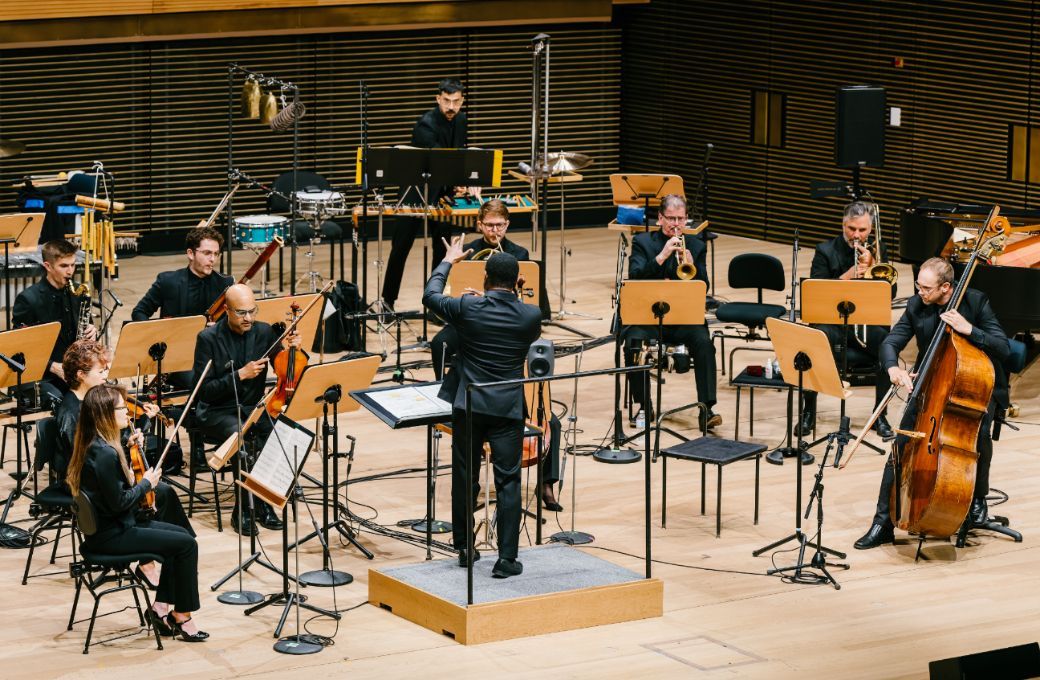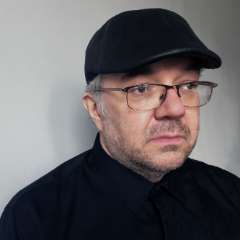The New York Philharmonic’s Sound On concert felt timely enough to be a newspaper. The opening work served as a double remembrance, followed by pieces on war and technology.

Hungarian composer Peter Eötvös wrote Ligetidyll in 2022 to mark the 100th anniversary of his countryman György Ligeti’s birth. Ligeti, who died in 2006, never heard the piece and Eötvös himself died in March at the age of 80. But the composer, who was guest conductor Kwamé Ryan’s teacher, did send preparation notes for this concert, the US premiere, “via WhatsApp, including emojis and everything,” Ryan noted before the performance.
A proper tribute to Ligeti should be full of life. Ligetidyll is that and more. It's delicate, muscular, grand, profound and playful, with a ticking clock (in the form of an amplified metronome) keeping the pace. Musicians at times stood or spoke Ligeti’s name and after the conclusion, orchestra and audience held silence for Eötvös.
Next on the program was Mask, written by Dutch composer Michael van der Aa. It opened with an intriguing, staticky low tone from the double bass that was echoed in the strings and ornamented by the rest of the ensemble. The ‘extraneous’ noise was a percussionist with a roll of gaffer tape. Pre-recorded orchestral sounds nearly mirroring the musicians and, again, an amplified metronome further augmented the ensemble. The result was illusory but that didn’t seem the impetus; it was more like trying to discern objects outdoors at night. The music worked in waves, particles increasing in velocity but always subsuming and rebuilding, like a loop that uncharacteristically gains mass, varying in density and duration.
New York City has been fortunate to have Londoner Hannah Kendall here for doctoral studies as her evocative and impactful work has been programmed with some frequency of late. Her Shouting forever into the receiver (2022) took its title from a text by Ocean Vuong about a toy soldier but used passages from the Book of Revelations as narrative, spoken by the percussionist into a walkie talkie. His distorted voice was sometimes subsumed by the orchestra as well but even when it couldn’t be discerned, the gravity of the narration permeated. The music was a landscape where this voice sat, in mud and drifting clouds. Kendall is adept at putting intense emotion in front of social agendas; the instruments hummed and trembled and buzzed as much as they delivered melodic lines. An onstage music box quietly playing Beethoven’s Ode to Joy setting brought it to a close.
Mary Kouyoumdjian was born in San Francisco to Armenian immigrant parents. Much of her work touches on heritage and diaspora, directly addressed in the premiere performance of the NY Phil-commissioned ANDOUNI (Homeless). Kouyoumdjian’s interviews with refugees after 2020 military attacks were incorporated into the score and played with projections of her subjects by photographer Scout Tufankjian. The soundtrack was a submersion into layers of tones with a vibraphone pulse, building to what was easily the loudest thing heard all evening. A recorded voice reported, “seeing this level of suffering and pain is beyond anything I’ve experienced before... thinking about what this means for the future of Armenia. Nothing feels safe anymore. It’s what people keep saying. ‘Nowhere is safe.’ I want to be able to reflect and say something but right now there’s nothing.” When there are no words, art and music sometimes speak for us.


